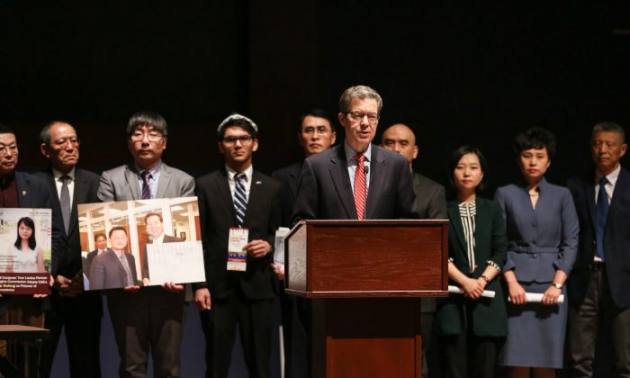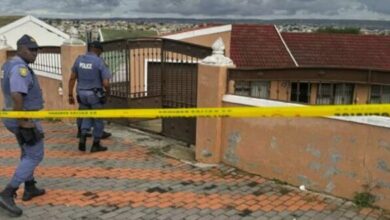President and Congress join to target China over religious persecution

For the first time, persecuted faith groups in China and human rights organizations are forming a coalition to advance religious freedom in China, with the backing of the Trump administration and members of Congress.
Sam Brownback, the U.S. ambassador at large for International Religious Freedom, and Rep. James P. McGovern (D-Mass.), the newly appointed chairman of the Congressional-Executive Commission on China (CECC) and co-chairman of the bipartisan Tom Lantos Human Rights Commission, joined representatives from persecuted faith groups in China, in vowing to advocate for and defend religious freedom in China at a press conference to announce the formation of the Coalition to Advance Religious Freedom in China (CARFC) in Washington.
“I am here to add the administration’s support,” Brownback said on March 4. “We are deeply concerned by the Chinese government’s tightening restrictions on religious practice, including for Protestants, Catholics, Tibetan Buddhists, Muslims, the Falun Gong, and others.”
Brownback pointed out that in recent years, new regulations were implemented to penalize all unregistered religious activities, including actions by foreigners.
“We are here today to give you a chance to hear from the groups that are affected by these actions, and to officially recognize the launch of the Coalition to Advance Religious Freedom in China by the International Religious Freedom Roundtablem,” he said.
“We believe religious freedom is a universal human right. … It is a fundamental right. Our country was founded on it. It is in the Chinese Constitution. It is in the U.N. Charter, the Declaration of Human Rights. We believe that every person around the world should be free to believe or not to believe, as they see fit.”
McGovern said he was happy to see that so many organizations have decided to come together—transcending cultural, ethnic, and doctrinal differences—to work hard toward religious freedom of China. He said he came to show support “to reiterate my commitment to do all I can as a member of Congress to help bring the persecution to an end.”
McGovern said he would do everything he could to not only raise the visibility of human rights violations in China, but also help Americans understand why what happens in China matters.
Former Rep. Frank Wolf (R-Va.) made a passionate speech, calling for special attention to be paid to the more than 100 Confucius Institutes at U.S. universities, as well as to Western companies that sell products to China that fuel human-rights abuses.
He said every college that has a Confucius Institute should invite Catholic priests, Protestant pastors, Uyghurs, Tibetans, and Falun Gong practitioners to speak, and that if the institute does not allow that, it should be removed from campus.
A United Force
Greg Mitchell, chair of the International Religious Freedom Roundtable, said that Wolf, Brownback, and others had been recommending for some time that all the persecuted groups be united and become “one unit, one team and speak with one voice … and we are finally doing it now.”
“By forming a Coalition to Advance Religious Freedom in China, persecuted faith communities again unite their voices in support of religious freedom for all in China,” he said.
Mitchell said that while the coalition is still in its initial stage, he anticipates that more groups will join, and they will organize more activities to “try to put pressure on the U.S. government to take further concrete actions, to put sanctions on China.”
Mitchell says he thinks the coalition will have a strong impact as a united force.
One of the coalition members, Louisa Greve, director of External Affairs of the Uyghur Human Rights Project, suggested “urging the use of the Global Magnitsky Act to hold Chinese government officials responsible for the well-documented campaign of oppression targeting Uyghurs and other ethno-religious communities in the Uyghur Region,” and passing the Uyghur Human Rights Policy Act and the Uyghur Intervention and Global Humanitarian Unified Response Act.
Dr. Han Lianchao, vice president of Citizen Power Initiatives for China, called for a tougher stance against Huawei and China Electronics Technology Group, which helped the Chinese Communist Party (CCP) establish a surveillance system throughout the country that was worse than what was described in George Orwell’s “Nineteen Eighty-Four.”






